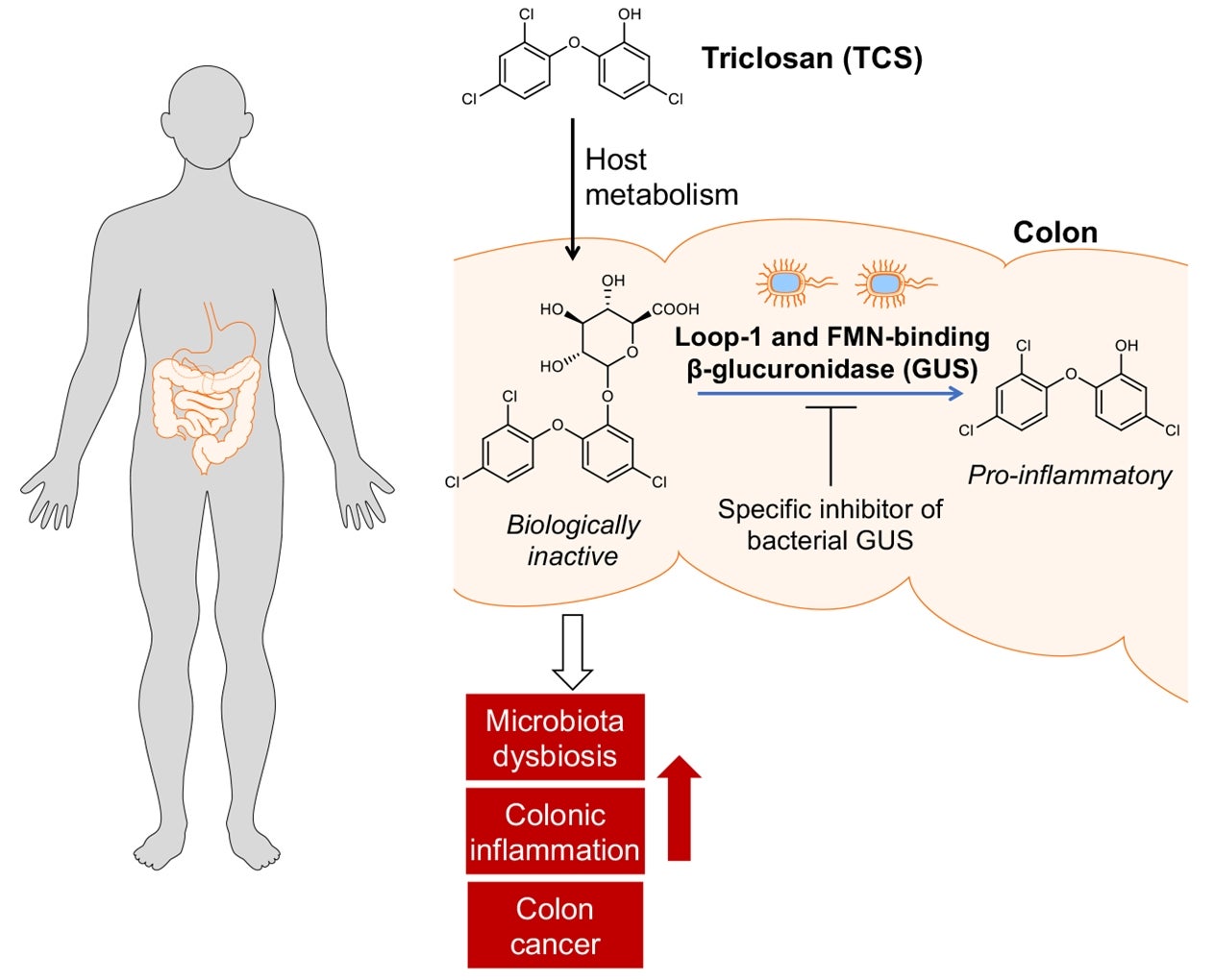Gut microbial enzymes involved in colonic metabolism and gut toxicity of triclosan
September 26, 2022NUS food scientist found that certain gut microbial enzymes can cause the reactivation of triclosan (TCS) from its inactive metabolite.
Triclosan (TCS) is a chemical commonly used as an antimicrobial ingredient in a wide range of consumer products. In 2016, following risk assessment by the United States (US) Food and Drug Administration (FDA), TCS is removed from over-the-counter handwashing products in the US market. However, TCS remains approved for use in low concentrations in other consumer products including toothpastes, cosmetics and toys.
In 2018, Associate Professor ZHANG Guodong currently with the Department of Food Science and Technology, NUS showed that exposure to TCS, at human exposure-relevant doses, induces colonic inflammation, increases the severity of colitis and exacerbates the development of colitis-associated colon cancer in murine models. This finding supports the hypothesis that TCS could be a potential risk factor of inflammatory bowel disease (IBD) and colon cancer. The adverse effects of TCS on gut health require the presence of gut microbiota. Gut microbiota are the microorganisms such as bacteria that live in the digestive tracts. In the germ-free murine models which do not have the microbiota, TCS fails to induce colonic inflammation. However, the functional roles of the gut microbiota involved are not clear, and the specific gut microbial factors involved are unknown.
Building on his findings, Prof Zhang recently elucidated the detailed molecular mechanisms of gut microbiota associated with the gut toxicity of TCS. His research team found that gut commensal microbes and specific gut microbial β-glucuronidase (GUS) enzymes mediate colonic metabolism of TCS. This leads to metabolic reactivation of TCS in the colon and results in subsequent gut toxicity. The study also determined the crystal structures of the identified microbial GUS enzymes and elucidated the specific structural motifs that are required for metabolism of TCS.
Prof Zhang said, “Targeted inhibition of the microbial GUS enzymes removed the colitis-promoting effects of TCS in murine models, providing scientific evidence that GUS-mediated TCS metabolism is required for the gut toxicity of TCS. Overall, our findings highlight the critical roles played by gut microbiota in the metabolism and toxicity of xenobiotic compounds.”
The research team plans to perform human studies as part of their next steps to determine the extent to which exposure to TCS causes microbiota dysbiosis and gut disorders in humans.

Figure shows that gut microbes and specific gut microbial enzymes can mediate colonic metabolism and cause gut toxicity of triclosan (TCS).
References
[1] Yang HX; Wang WC; Romano KA; Gu M; Sanidad KZ; Kim D; Yang J; Schmidt B; Panigrahy D; Pei RS; Martin DA; Ozay EI; Wang YX; Song MY; Bolling BW; Xiao H; Minter LM; Yang GY; Liu ZH; Rey FE*; Zhang GD*, “A common antimicrobial additive increases colonic inflammation and colitis-associated colon tumorigenesis in mice” SCIENCE TRANSLATIONAL MEDICINE Volume: 10 Issue: 443 Article Number: eaan4116 DOI: 10.1126/scitranslmed.aan4116 Published: 2018.
[2] Zhang J; Gibbs ME; Sanidad KZ; Zhang H; Liang Y; Zhao E; Chacon-Vargas K; Yeliseyev V; Parsonnet J; Haggerty TD; Wang G; Simpson JB; Jariwala PB; Beaty VV; Yang J; Yang H; Panigrahy A; Minter LM; Kim D; Gibbons JG; Liu L; Xiao H; Borlandelli V; Overkleeft HS; Cloer EW; Major MB; Goldfarb D; Cai Z*; Redinbo MR*; Zhang G*, “Microbial enzymes induce colitis by reactivating triclosan in the mouse gastrointestinal tract” NATURE COMMUNICATIONS Volume: 13 Article number: 136 DOI: 10.1038/s41467-021-27762-y Published: 2022.


